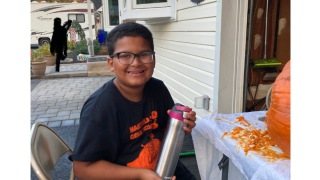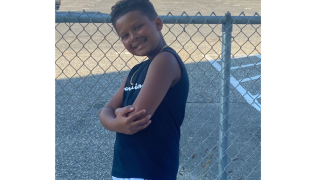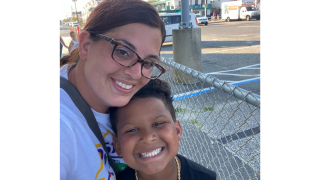Repeated Concussions: Liam’s Story
Published on
Published on
After a youth athlete sustains repeated concussions, CHOP’s Minds Matter Concussion Program encourages him to change sports to regain control of his future.
Eleven-year-old Liam loves to play football, but after six back-to-back concussions in the past 3 years, he’s permanently benched from the gridiron. What’s more surprising than the sheer number of concussions he’s endured is where they occurred – three at home, three at school and zero playing football.
“It’s been a really challenging time for Liam,” says his mom, Jessica. “He was an all-star football player but has had to sit out the past 2 years. Thankfully, we’ve had support from Children’s Hospital of Philadelphia and the team there has helped Liam refocus on what he can do instead of what he can’t.”
Liam has always been an active, sporty kid who likes to goof around. He started playing baseball at age 3, basketball at age 5 and flag football soon after. “He’s always moving,” adds Jessica.
When Liam was 8 years old, he was dancing in the shower when he fell and hit his head. His family drove to Children’s Hospital of Philadelphia (CHOP) where they met Naomi Brown, MD, FAAP, CAQSM, a pediatric sports medicine specialist with a focus on sports injuries and concussions. Dr. Brown is also part of the Minds Matter Concussion Program at CHOP.
Dr. Brown diagnosed Liam with his first concussion and encouraged him to follow concussion recovery protocols: rest, time off from school, limited screen time and breaks as needed.
When Liam felt better, he returned to school, sports and being his typically happy-go-lucky self – which included more silly antics. Over the next year, he sustained two more mild concussions after accidental falls at home. Again, he turned to Dr. Brown at CHOP. She helped Liam understand ways to avoid future concussions (repeating what his parents had already told him).
So far, Liam’s symptoms had not been severe. He had not needed extensive treatment and could just receive supportive care at home. That all changed with his next concussion.
Liam was in fourth grade when a fellow student pushed Liam’s chair backwards at school. Liam fell hard, smacking his head on the floor. An ambulance rushed Liam to CHOP where he was diagnosed with a more severe concussion.
This time, Liam needed more support. He had lingering headaches, trouble focusing his eyes and balance problems. Dr. Brown and Lindsey M. Calandra, MSN, CRNP, a nurse practitioner with the Minds Matter Concussion Program, taught Liam and his mom how to do visio-vestibular (eye movement and balance) exercises at home, and he received additional outpatient vestibular physical treatment at CHOP Specialty Care & Surgery Center, Bucks County.
Therapy included visual exercises like following his mom’s finger as she moved it in front of his eyes or following a red dot from a laser pointer. It also included physical tasks like standing on one foot, stretching his arms out to the side, then touching his nose. The goal was to help Liam’s brain, body and eyes to relearn how to work together.
After his fourth concussion, Liam missed more than a month of school.
When Liam returned to school, he was able to quickly catch up academically. Though his doctors would not clear him to play football, they did allow him to return to other sports – baseball and basketball – where the risk of head injury was lower.
Unfortunately, Liam sustained another injury at school caused by a fellow student. His parents felt the incident was bullying and asked school officials to better watch its students.
This time, Liam was hospitalized and sustained serious injuries to his eyes, bladder, GI system and brain. His mental health was also affected. After a few days in the hospital, Liam transitioned to outpatient care closer to home at CHOP’s Bucks County location in Chalfont, PA.
For months, Liam saw multiple CHOP specialists from concussion; ear, nose and throat; gastroenterology, urology, and physical therapy, as well as his primary physician. Liam also received support from Jamie Shoop, PhD, a CHOP psychologist who specializes in treating youth with concussions.
After a sixth concussion occurred months later, Liam’s recovery was stalled by worsening headaches, trouble with focus and balance, as well as recurring bladder, bowel and mental health symptoms. Looking at the computer was particularly challenging.
Dr. Brown and a team of therapists and specialists collaborated to treat Liam’s challenging symptoms, helping him regain his equilibrium and supporting his return to school, sports and activities.
“Dr. Brown was very helpful; very comforting,” Jessica says. “The whole team really took their time to listen to Liam, to talk with him and help him learn how to avoid some concussions.”
The CHOP team also supported Liam’s family when school officials requested detailed information about the support he needed to resume in-classroom learning.
In May 2023, Liam “graduated” from CHOP’s Concussion Program.
Liam is now in fifth grade at a new school. Though his physical recovery is complete, he is still in therapy to improve his mental health and socialization with peers. Academically, he has bounced back: he’s a straight-A student who loves history and math. He still enjoys playing competitive baseball and basketball – though football remains off-limits. Liam is also learning how to play golf, under the watchful eye of his grandfather.
His family is optimistic about his future. Liam hopes to become an architect, engineer or police officer.
For Liam’s immediate future, Jessica has this hope: “As much as we love CHOP, we really hope he doesn’t have to go back because of another concussion!”